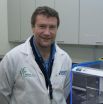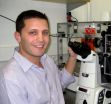(Press-News.org) Bisphenol A, a substance found in many synthetic products, is considered to be harmful, particularly, for fetuses and babies. Researchers from the University of Bonn have now shown in experiments on cells from human and mouse tissue that this environmental chemical blocks calcium channels in cell membranes. Similar effects are elicited by drugs used to treat high blood pressure and cardiac arrhythmia. The results are now presented in the journal "Molecular Pharmacology."
The industrial chemical bisphenol A (BPA) is worldwide extensively utilized for manufacturing polycarbonates and synthetic resins. "This substance has been shown to affect the hormonal system and may have negative effects on the function of enzymes and carrier proteins," reports Prof. Dr. Dieter Swandulla from the Institute of Physiology II at the University of Bonn. BPA is associated with heart disease, diabetes, obesity, cancer, and neurological dysfunction. "It seems that fetuses and newborns are particularly sensitive to BPA," adds the physiologist. Due to its unpredictable effects, the EU Commission banned the use of BPA in baby bottles in 2011 as a precaution.
Bisphenol A blocks multiple essential calcium channels
The team of researchers around Prof. Swandulla now reports that BPA reversibly blocks calcium channels essential for cell function in mouse and human cells. Calcium ions flowing through these pore-like so-called channel proteins into living cells, control e.g. the contraction of heart muscle cells, the activity of enzymes, and the communication of nerve cells with each other. "Drugs such as those used to treat high blood pressure and cardiac arrhythmia on the one hand, and neurotoxins, such as heavy metals, on the other hand act on exactly the same calcium channels," explains the physiologist from the University of Bonn. "This indicates that BPA can indeed have adverse effects on human health." Since BPA binds to the calcium channels reversibly, there is at least the possibility of the chemical being eliminated from the body.
Bisphenol A and its derivatives are ubiquitous
Nowadays BPA and its related substances can be detected almost everywhere in the environment. Effective doses are found in CD's, paper money, thermal paper, food cans, dental fillings and flame retardants, even in the breathing air and in house dust. Humans are meanwhile chronically exposed to these compounds. "This is why it would be desirable to completely stop the production of BPA," says Prof. Swandulla. "Due to the high-volume production and its widespread occurrence, it would, however, take a very long time to remove this chemical from the environment and the human organism." Consequently, alternatives to BPA should be utilized which are harmless to humans and other organisms.
###Publication: Bisphenol A inhibits voltage-activated Ca2+ channels in vitro: mechanisms and structural requirements, "Molecular Pharma-cology," DOI: 10.1124/mol.112.081372
Contact:
Prof. Dr. Dieter Swandulla
Institut für Physiologie II
Ph. +40 228 7360100
Email: dieter.swandulla@ukb.uni-bonn.de
Environmental chemical blocks cell function
Researchers from the University of Bonn have discovered adverse effects of Bisphenol A on calcium channels
2012-12-06
ELSE PRESS RELEASES FROM THIS DATE:
New evidence for epigenetic effects of diet on healthy aging
2012-12-06
New research in human volunteers has shown that molecular changes to our genes, known as epigenetic marks, are driven mainly by ageing but are also affected by what we eat.
The study showed that whilst age had the biggest effects on these molecular changes, selenium and vitamin D status reduced the accumulation of epigenetic changes, and high blood folate and obesity increased them. These findings support the idea that healthy ageing is affected by what we eat.
Researchers from the Institute of Food Research led by Dr Nigel Belshaw, working with Prof John Mathers and ...
New understanding can lead to srategies for dealing with neurodegenerative diseases
2012-12-06
Jerusalem Dec. 6, 2012 – A new understanding of what takes place on the cellular level during the development of neurodegenerative diseases, such as Parkinson's, Alzheimer's, ALS and Huntington's diseases, offers promise towards possible new strategies for combating such diseases, say Hebrew University of Jerusalem researchers.
Neurodegenerative conditions result from an impairment of motor function or cognitive function or both. This impairment results from degeneration in the particular area of the brain responsible for those functions.
Although these neurodegenerative ...
'Releasing' people from Catholic guilt increases generosity towards church, research shows
2012-12-06
People who recall being absolved of their sins, are more likely to donate money to the church, according to research published today in the journal Religion, Brain and Behavior.
Researchers from Royal Holloway and the University of Oxford assigned participants two memory tasks. In the first, they were asked to privately recall a sin that they had committed in the past, while in the second, they recalled attending confession for this sin or imagined doing so, if they had not confessed in reality.
Each participant was also given an opportunity to donate to a local Catholic ...
My microbes
2012-12-06
We all have E.coli bacteria in our gut but each of us carries a version that is genetically slightly different. The same can be said of most gut microbes: our own gut metagenome, that is the sum of all the genomes of all our gut microbes, appears to be really specific to each of us, and to remain stable over time. For the first time, researchers from the European Molecular Biology Laboratory (EMBL) have studied this metagenome at such a high resolution that individual mutations in the various strains could be analysed. Their findings, published today in Nature, could have ...
Insight into DNA reprogramming during egg and sperm cell development
2012-12-06
Scientists at the Babraham Institute have gained a new understanding of when and how the DNA in developing egg and sperm cells is 'reset', in preparation for making a new embryo. It is well known that small chemical groups can be added to DNA to alter gene activity, these modifications to the DNA are acquired during development in the womb and throughout adult life and can arise from changes in environment. Most of these modifications are removed in immature egg and sperm cells to 'reset' the DNA and to erase any 'environmental memory', but some remain. Decoding this reprogramming ...
Cocktail boosts immune cells in fighting cancer
2012-12-06
Fighting cancer using the body's own defense system is a promising treatment approach. Immune therapies have even become clinical routine in treating a few cancers such as malignant melanoma and prostate cancer. Natural killer cells (or NK cells) are considered to be particularly suitable weapons against cancer. They are part of the innate immune system and respond to a wide range of cancer cells of diverse origin. Moreover, NK cells also kill tumor cells that have lost a specific target and go unnoticed by other immune cells.
"The big problem in using NK cells for therapy ...
Warm sea water is melting Antarctic glaciers
2012-12-06
The ice sheet in West Antarctica is melting faster than expected. New observations published by oceanographers from the University of Gothenburg and the US may improve our ability to predict future changes in ice sheet mass. The study was recently published in the journal Nature Geoscience.
A reduction of the ice sheets in Antarctica and Greenland will affect the water levels of the world's oceans.
It is therefore problematic that we currently have insufficient knowledge about the ocean circulation near large glaciers in West Antarctica. This means that researchers ...
Feeling disgust may enhance our ability to detect impurities
2012-12-06
Disgust – it's an emotion we experience when we encounter things that are dirty, impure, or otherwise contaminated. From an evolutionary standpoint, experiencing the intense, visceral sense of revulsion that comes with disgust presumably helps us to avoid contaminants that can make us sick or even kill us. But new research suggests that disgust not only helps us to avoid impurities, it may also make us better able to see them.
If something looks dirty and disgusting, we typically assume it's contaminated in some way; when something is white, however, we are more likely ...
Researchers investigate impacts of climate change on rare tropical plants
2012-12-06
Research led by the University of York has found that the impacts of climate change on rare plants in tropical mountains will vary considerably from site to site and from species to species.
While some species will react to climate change by moving upslope, others will move downslope, driven by changes in seasonality and water availability. The researchers believe that this predicted variation, together with the long-term isolation and relative climatic stability of the mountains, may shed light on historical processes behind current patterns of biodiversity.
The study, ...
How cold will a winter be in 2 years?
2012-12-06
How well are the most important climate models able to predict the weather conditions for the coming year or even the next decade? The Potsdam scientists Dr. Dörthe Handorf and Prof. Dr. Klaus Dethloff from the Alfred Wegener Institute for Polar and Marine Research in the Helmholtz Association (AWI) have evaluated 23 climate models and published their results in the current issue of the international scientific journal Tellus A. Their conclusion: there is still a long way to go before reliable regional predictions can be made on seasonal to decadal time scales. None of ...
LAST 30 PRESS RELEASES:
Kennesaw State's Vijay Anand honored as National Academy of Inventors Senior Member
Recovery from whaling reveals the role of age in Humpback reproduction
Can the canny tick help prevent disease like MS and cancer?
Newcomer children show lower rates of emergency department use for non‑urgent conditions, study finds
Cognitive and neuropsychiatric function in former American football players
From trash to climate tech: rubber gloves find new life as carbon capturers materials
A step towards needed treatments for hantaviruses in new molecular map
Boys are more motivated, while girls are more compassionate?
Study identifies opposing roles for IL6 and IL6R in long-term mortality
AI accurately spots medical disorder from privacy-conscious hand images
Transient Pauli blocking for broadband ultrafast optical switching
Political polarization can spur CO2 emissions, stymie climate action
Researchers develop new strategy for improving inverted perovskite solar cells
Yes! The role of YAP and CTGF as potential therapeutic targets for preventing severe liver disease
Pancreatic cancer may begin hiding from the immune system earlier than we thought
Robotic wing inspired by nature delivers leap in underwater stability
A clinical reveals that aniridia causes a progressive loss of corneal sensitivity
Fossil amber reveals the secret lives of Cretaceous ants
Predicting extreme rainfall through novel spatial modeling
The Lancet: First-ever in-utero stem cell therapy for fetal spina bifida repair is safe, study finds
Nanoplastics can interact with Salmonella to affect food safety, study shows
Eric Moore, M.D., elected to Mayo Clinic Board of Trustees
NYU named “research powerhouse” in new analysis
New polymer materials may offer breakthrough solution for hard-to-remove PFAS in water
Biochar can either curb or boost greenhouse gas emissions depending on soil conditions, new study finds
Nanobiochar emerges as a next generation solution for cleaner water, healthier soils, and resilient ecosystems
Study finds more parents saying ‘No’ to vitamin K, putting babies’ brains at risk
Scientists develop new gut health measure that tracks disease
Rice gene discovery could cut fertiliser use while protecting yields
Jumping ‘DNA parasites’ linked to early stages of tumour formation
[Press-News.org] Environmental chemical blocks cell functionResearchers from the University of Bonn have discovered adverse effects of Bisphenol A on calcium channels

